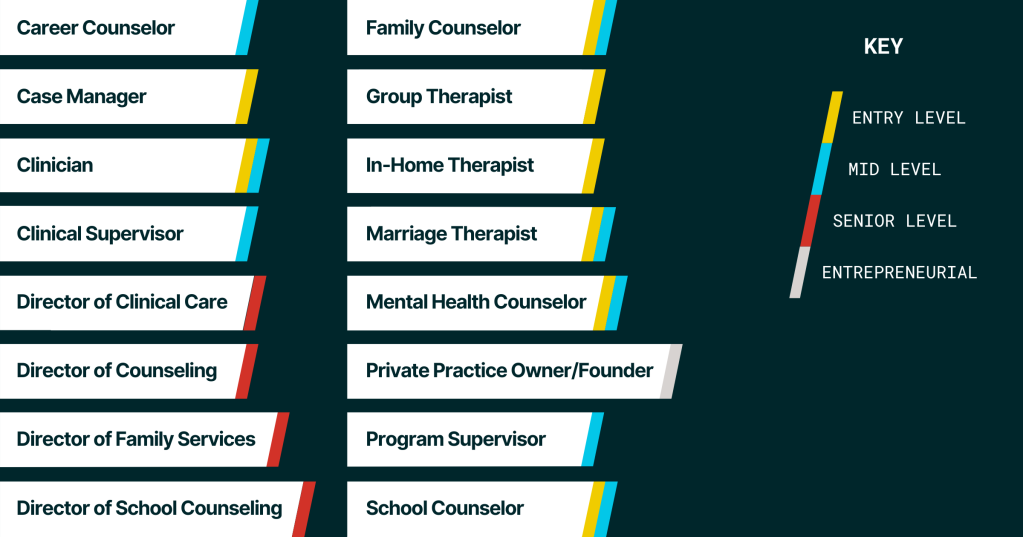Counseling is an expanding field that draws a large pool of prospective job seekers since it intersects with many other industries (healthcare, education, corrections, etc.). There are many career paths a counselor can explore. According to the U.S. Bureau of Labor Statistics (2022), the job outlook for counselors in the mental health and substance abuse subfields is expected to grow 22% from 2021 to 2031, much faster than average. Counselors are particularly well positioned for job stability and future growth based on their ability to provide specialized treatment services sought by both individuals and organizations.
Counselors typically focus on one of many specializations, including mental health, school, substance abuse, trauma, family and marriage, career, or higher education counseling. In addition to these specialties, counselors can focus on specific populations, mental health challenges, or specific counseling modalities. To become licensed, which some types of counseling or practices may require, counselors must complete graduate school, apply for licensure based on state requirements, and receive supervision by a licensed counselor. After receiving a license, counselors are required to complete yearly continuing education credits to ensure they’re staying up to date on best practices in the counseling field.

Let’s review this skill set together by discussing how counseling expertise can be acquired, applied, and transformed into a fulfilling career.
What can I do with counseling skills?
Counseling professionals perform a wide range of tasks depending on their specific roles and expertise. Let’s delve into some of the different types of counseling that are utilized by professionals in the field and the responsibilities typically associated with the different counseling sub-categories.
Mental health counseling — Diagnose mental illnesses, conduct treatment and goal planning, and perform evidence-based modalities. This depends on location but would typically involve becoming licensed to perform mental health counseling on patients.
School counseling — Provide solution-focused and short-term counseling to students, refer students to other mental health professionals, and develop treatment plans. This involves creating comprehensive school counseling programs that include one-on-one counseling, group counseling, core curriculum lessons, and large-scale initiatives.
Substance abuse counseling — Provide support to patients suffering from drug or alcohol dependency, educate families to assist with the recovery process, and utilize clinical skills in group and individual therapy to help patients overcome addiction. This often involves working with patients in both inpatient programs and outpatient programs, who are often struggling with other co-occurring mental health disorders.
Family and marriage counseling — Utilize core clinical competencies to bring a family-centered perspective to treatment. This includes helping patients to develop communication skills, make decisions in a collaborative way, and resolve conflicts with one another.
Listen as the Director of Community Based Program Development and Engagement at TIME Organization Shareese Kess talks about the importance of working at an organization that values self-care and nurturing when working in an intense field:

Because we are humans and we all have behavioral health, whether it’s healthy or unhealthy, we all have behavioral health that we have to take care of. It’s very important to be in an organization that helps you to self-reflect and also helps you to deal with whatever challenges you have being in this profession. I just did a training on vicarious trauma and how easy it is to pick up on some of the stuff of our clients and we have to be able to recognize when we are burning out or recognize when there is some countertransference or behavioral health issues so that we can address it. I think it’s key to make sure that your direct supervisor is very supportive and understanding that because we are human, we need a certain level of support that other professionals may not need. It’s important to know what to do for self care, to take your vacation, to take your breaks, to know what populations are challenging to work with. To know when you’re burnt out to transfer that client because you can’t be effective, because, you know they have been so negative that you’re not…being able to help with change. So, it’s not unusual at all [to have to self reflect on behavioral health while working in the behavioral health field] unless you’re in an organization that does not recognize that you need the nurturing, you need the support, you need the acknowledgement just like anybody else, and actually a bit more than other professions.
Discover your career opportunities
As the demand for counseling grows, so do the job opportunities. Here are a few job titles available to individuals with counseling skills:

The term “therapist” is often used interchangeably with “counselor.” However, while a counselor can be a therapist, a therapist is not necessarily a counselor. “Therapist” encompasses a wide variety of mental health professions, including social workers and psychologists, and thus means that therapists could have a wide range of educational and employment experience in addition to their licensure and scope of practice. The differences among these mental health professions are important to understand if you plan to pursue a career in counseling.
Expert advice
“I would encourage individuals exploring this industry to realize the importance of self-awareness and having a mentor or supervisor whom they could have debriefing sessions with…Essentially, emotional intelligence is key; it involves self-awareness but also self-regulation, empathy, social skills, and motivation. These are skills to be aware of and to grow where needed, which can also be beneficial in various industries.”
— Nicole Pitt, career expert at edX

How can I acquire counseling skills and turn them into a career?
If developing counseling skills interests you, we recommend taking these steps:
Research is key when it comes to any career, and a career in counseling is certainly no exception. Take advantage of all the information out there, whether through browsing the internet for job titles, listening to relevant podcasts, or getting connected to professionals in the areas or positions that interest you.
Pro tip:
Explore your career possibilities. As part of your research, take every opportunity to learn more about topics in your desired field. Browse the edX course catalog at edx.org to see what counseling-related topics, courses, and programs interest you, and start building your counseling skills today.
One key part of the research phase is networking. This simple step is often overlooked and undervalued but can significantly impact your career trajectory. To clarify your career goals and aspirations, you must talk with professionals about what the work looks like.
You open a door of opportunity in your career by reaching out to professionals in your targeted fields, positions, and companies. Connecting with counseling professionals who could vouch for you and provide hard-to-find intel about the industries or organizations of interest is invaluable.
Pro tip:
We highly recommend scheduling Behavioral Interview Prep Guide to learn from and connect with counseling professionals and hiring managers to gather information. These contacts can help you learn new skills, offer advice, and share job opportunities.
Check out our Networking Guide and Outreach Templates and Resources for help getting started.
To supplement your understanding of what others are doing professionally, gain clarity on your own goals and aspirations. Ask yourself what about counseling interests you — the possibilities are endless.
An important question to ask yourself is: Who am I interested in counseling? Your response may help determine which counseling skills will best serve your career.
Identify your target audience
Determining who you want to work with and counsel will enable you to decide what type of skills you want to pursue. The list below encompasses options for the audience you may want to consider:
- Children or adolescents
- Families or couples
- Individuals with mental health diagnoses
- Individuals with substance use disorder
- High school students
- College students
- Individuals with health issues
- Hospital patients
- Individuals in the corrections system
Skill set for counseling
For those interested in utilizing clinical modalities, you‘ll need to rely on a variety of counseling tools in your practice. View the list below for examples of these skills:
- Psychology
- Treatment planning
- Group facilitation
- Crisis intervention
- Case management
- Conflict resolution
- Behavioral therapy modalities
- Family therapy
- Client-centered approach
- Solution-focused approach
- Trauma-informed approach
Pro tip:
Transferable skills are skills you carry from one job to another, enhancing your adaptability and versatility. There are many, but here are a few particular transferable skills that complement counseling skills well: Adaptability, communication, empathy, collaboration, resiliency, flexibility, and diplomacy.
You can learn counseling skills in a variety of ways. Consider which route best fits your needs and learning style. Here are a few options to consider:
Self-education — If you want to learn asynchronously, informally, or casually, self-education is a great place to start and determine if counseling continues to be a career path of interest. Many approaches to this learning style support career goals, budgets, and time commitments. Here are some to consider:
- Online courses: edX.org offers several instructor-led and self-paced counseling courses that may be of interest.
- Professional certifications: Professional certifications are a great way to build off existing knowledge and add to your counseling repertoire. Professional certifications are a great addition to your resume and prove your clinical skills for roles in counseling. edX.org offers several certificate programs that may interest you.
Degree programs — If you do not have career experience in psychology, social work, counseling, or education, you may want to consider a degree program. Many counseling-related positions require advanced clinical skills, and degree programs can be an efficient way to acquire these skills. Education, psychology, and sociology are popular degree programs among counseling professionals.
Interviewing for counseling positions will likely rely on behavioral interviewing questions. These questions will ask about your behaviors in past scenarios as a way to gauge how you would react in future settings. Potential employers will want to know how you handle stress in addition to how you engage with clients.
Helpful resources:
The career team at edX has resources and workshops to help you fine-tune your application materials and prepare for interviews. Start with our Behavioral Interview Prep Guide and LinkedIn Guide.
Once you achieve your counseling career goal, celebrate your success. The career journey is full of ups and downs, and every victory deserves acknowledgment.
With that said, your journey doesn’t end here — it’s only just beginning. Give yourself grace and understand that careers are not linear. Here are some ways you could continue growing your counseling skills:
Continued learning — Always reference our course catalog on edX.org for continued learning opportunities. It never hurts to brush up on your skills, expand your knowledge within the industry, or learn about other subjects that could apply to your work, interests, or something in between.
Promotions — As the counseling industry continues to grow, so will future job opportunities. To position yourself well for promotions, you will need to stay current on continuing education opportunities and develop leadership skills.
Promotions in counseling:
Here is an example of a senior role that you may want to work toward as you advance your career in counseling:
Director of Clinical Services: Lead and oversee a team of counselors who provide evidence-based therapeutic modalities and crisis management or intervention to patients.
Pivots — Make sure to regularly check in with yourself and your satisfaction with daily tasks. If you are dissatisfied in your current role, take stock of what you like and dislike about it, keep your eyes out for company-sponsored growth opportunities, and pursue career pivots that optimize your background, skill set, and interests.
What could my career look like with a counseling skill set?
It is difficult to say exactly what your life would look like with a counseling skill set, but we can provide some insight. Consider how these may factor into your life plan:
Opportunity to make an impact — Counseling has the potential to positively impact individuals’ lives in so many facets and settings, including hospitals and healthcare, schools, family’s lives, correctional facilities, substance abuse programs, and more. Consider how you could use your counseling skills to positively impact the lives of others.
Life-long learning — Counseling professionals must stay up-to-date on clinical modalities and evidence-based practices, and you can expect a career that provides many learning opportunities, especially if you pursue licensure, which means you’ll be required to maintain continued learning opportunities.
Expert advice
“If your mental health isn’t in a good place, then your performance at work isn’t going to be optimal…it’s very important to find a balance, even if it’s integrated into the workday…especially considering what you may be doing at work.”
— Lindsey Dickson, career expert at edX

What are my next steps?
Learn about counseling:
Register for a course on edX to learn about a variety of topics within the counseling industry, such as Counseling and Psychotherapy Theory, Counseling Practice and Research, and Master of Arts in School Counseling.
Watch a session:
Watch a relevant session on our Events page to learn more about the industry and other professionals’ experiences within it.




